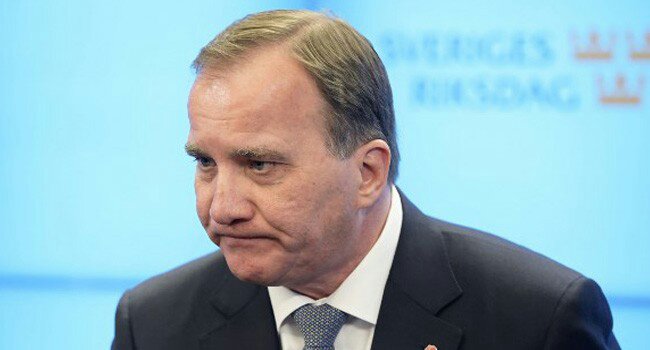Swedish Prime Minister Stefan Lofven speaks to the press after he was ousted in a vote of no-confidence in the Swedish Parliament Riksdagen on September 25, 2018 in Stockholm.
Anders WIKLUND / TT News Agency / AFP
Sweden’s center-right opposition and the far right ousted Prime Minister Stefan Lofven in a vote of no-confidence on Tuesday, as the left and right blocs wrangle over who can form a new government after neither won a majority in September 9 elections.
Lofven’s departure was widely anticipated. The head of the opposition four-party Alliance, Ulf Kristersson, has since election night insisted that he intends to try to form a government.
With neither bloc able to build a majority, the far-right, anti-immigration Sweden Democrats, who won almost 18 percent of votes in the election and is the country’s third-biggest party, has demanded it be given influence over Swedish politics in exchange for its support in parliament.
But neither the left nor right has been willing to negotiate with the Sweden Democrats.
“Sweden needs a new government that has broad political support to undertake reforms,” Kristersson told parliament moments before the confidence vote on Tuesday.
A total of 204 of 349 members of parliament voted against Lofven, while 142 voted in favor.
The speaker of parliament, Andreas Norlen, will begin talks on Thursday with the leaders of the eight parties represented in parliament to determine who is best placed to form the next government.
Norlen, a member of Kristersson’s conservative Moderate Party, is widely expected to task Kristersson with the job.
But the road ahead is tricky.
A collaboration with the Sweden Democrats would give the Alliance the majority it needs, but since that option is unthinkable for two Alliance parties — the Liberals and the Centre — Kristersson has so far refused to go down that route.
Lofven’s leftwing bloc holds 144 seats in the new parliament, just one more than the four-party center-right Alliance. The Sweden Democrats hold 62 seats.
The left-wing bloc is made up of the Social Democrats and the Greens, who have ruled together with the informal support of the ex-communist Left Party since 2014.
Far-right influence
The Social Democrats posted their worst election score in more than a century, but they remain Sweden’s biggest party, far ahead of Kristersson’s Moderates and the Sweden Democrats.
Lofven will stay on as prime minister in a caretaker role until a new government is in place, which could take weeks.
After his ouster, Lofven issued a stark warning to the Alliance about cooperating with the Sweden Democrats.
“If the Alliance chooses to govern as the smaller bloc they will be totally dependent on the Sweden Democrats,” he said.
“The Sweden Democrats were founded by neo-Nazi members of the Swedish white supremacy movement. They have repeatedly been found to have ties to racist and neo-Nazi organizations,” Lofven added.
“All eyes are now on the Alliance’s big election promise to the Swedish people that it would never govern with the support of the Sweden Democrats.”
The Sweden Democrats said Tuesday that it was ready “to negotiate, cooperate, and talk with all parties”.
“But we will bring down any attempt to form a government that does not give us any influence,” the party’s leader Jimmie Akesson warned.
Since it has ruled out the far right, the Alliance has instead invited the Social Democrats to a cross-bloc cooperation.
While Lofven himself has been a fervent champion of cross-bloc politics, he has rejected any Social Democratic support for an Alliance minority government.
The Social Democrats are the country’s biggest party and will “never be a support party,” Lofven reiterated Tuesday.
“The Social Democrats won the most mandates” in parliament, he said. “Today’s vote doesn’t change anything in terms of the mandates decided by voters.”
Lofven has meanwhile courted the Centre and Liberal parties. If the Alliance were to fail to form a government, they could possibly switch to Lofven’s side, observers say.
The speaker of parliament has four attempts to designate a party leader to build a government. After that, new elections have to be called.




Share your thoughts